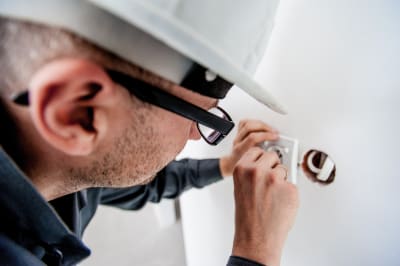Individuals in Minnesota are encouraged to pursue electrician careers for several reasons. For one, starting a career in the field is possible without breaking the bank on a four-year college education. Minnesota’s training options, which are both comprehensive and affordable, make it a financially viable career choice. Additionally, the career boasts strong job prospects and ample opportunity for growth.
If you are a Minnesota resident looking for guidance on starting a successful career as an electrician, you have come to the right page. Below, we briefly summarize everything you need to know beforehand.
You’ll find a step-by-step breakdown of the process, the certification possibilities and licensing requirements, and even a few top training programs for top-quality, all-around education.
How to Become an Electrician in Minnesota
Below are the major requirements and considerations for becoming an electrician in Minnesota.
Obtaining Training
As a future electrician in Minnesota, the key thing to do is acquire in-depth training at a relevant institution. This institution can vary depending on individual preference and specific circumstances.
However, the most popular options include apprenticeship programs, technical and trade schools, and on-the-job training/assistant opportunities.
Apprenticeship Programs
Unlike trade schools, apprenticeship programs are mainly about hands-on experience. That said, they also tend to include provisions for classroom instruction.
A major appeal of these programs is their access to experienced instructors and supervisors, who are typically successful professionals looking to bring up a new batch of capable electricians in the state.
Apprenticeship programs for aspiring electricians in Minnesota tend to last between 2 - 3 years.
Trade and Technical Schools
Trade schools also offer high-quality training in the estate’s state’s electrical technology, with the added certificate/associate degree, which can make employment a lot easier.
Those looking for highly comprehensive training may enroll in a four-year program, which will allow them to secure employment in advanced positions with some of the state’s top companies.
Electricians Assistant
It is also possible for an aspiring electrician to acquire real-world experience and hands-on training by shadowing a licensed electrician in the state. The goal is to learn under them for a significant amount of time before branching out, securing employment elsewhere, or starting a business.
Licensure & Certification Requirements
The Minnesota Department of Labor and Industry is responsible for issuing a state license to electricians in Minnesota. While it is possible to perform basic electrical work without a license, candidates must acquire one to take on more advanced duties and bigger contracts.
The state offers both a journeyman electrician license and a master electrician license. Both require classroom training and real-world experience to obtain. Candidates must start by applying for the journeyman license, which costs $50 and must be renewed through 16 hours of continuing education every two years.
Journeyman electricians may obtain a master electrician license by paying another $50 exam fee and completing 16 hours of continuing education every other year.
Learn about licensing and certification in neighboring states:
Top Electrician Schools in Minnesota
The following are some electrician schools in Minnesota operating at very high educational standards.
Dunwoody College of Technology
Minneapolis, MN Online + Campus
Dunwoody College of Technology in Minneapolis is one of the state's top choices for electrician training. The school offers an Electrical Construction and Maintenance program that can be completed in two years. Graduates get to receive an associate degree.
Tuition
$21,503 - $30,518Contact
(612) 374-5800
info@dunwoody.edu
Lake Superior College
Duluth, MN Online + Campus
Lake Superior College is another wonderful school in the state with a popular electrician training program. This program, officially known as the associate degree program in Commercial and Residential Wiring, offers comprehensive training for several electrician roles.
Tuition
$5,784 - $6,125Contact
(218) 733-7600
info@lsc.edu
Northwest Technical College
Bemidji, MN Online + Campus
Lastly, candidates may also consider the Electrical Construction and Maintenance program Northwest Technical College in Bemidji offers to start their electrician career anywhere in Colorado.
Tuition
$5,896 - $12,540Contact
(218) 333-6600
admissions@ntcmn.edu
Explore electrician schools in Minnesota by city:
Salary & Career Outlook
Entry-level electricians in Minnesota typically start their careers with an average annual salary of around $ 53,783, which is on par with the average salary for other states, as revealed by a survey of professionals on Indeed. Once they acquire more experience on the job, however, electricians in Minnesota may start earning an annual average of up to $79,266.
The highest-paid electricians in the state often earn as much as $116,823. Experience level and location also greatly affect an electrician’s annual salary.
Cities such as Minneapolis, Rochester, and Duluth reward electricians in the state the most, with annual average salaries of $85,883, $83,331, and $79,770, respectively.
Electricians in Saint Paul and Saint Cloud earn an average annual salary of $79,281 and $78,820, respectively.





